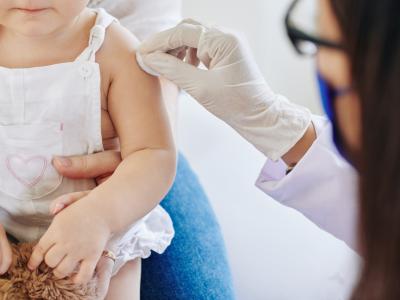No safety signals in pregnant women who got mRNA COVID vaccines
Preliminary findings from a large analysis of pregnant women who received mRNA COVID-19 vaccines showed no obvious safety signals, Centers for Disease Control and Prevention (CDC) researchers reported yesterday in the New England Journal of Medicine.
Using data voluntarily reported to three US vaccine safety monitoring systems—the "v-safe after vaccination health checker" surveillance system, the v-safe pregnancy registry, and the Vaccine Adverse Event Reporting System (VAERS)—the researchers examined outcomes among 35,691 pregnant women who received either the Pfizer/BioNTech or Moderna vaccines from Dec 14, 2020 through Feb 28. Outcomes included local and systemic reactogenicity, participant-reported pregnancy outcomes, neonatal outcomes, and pregnancy- and neonatal-specific adverse events.
Injection-site pain, fatigue, headache, and myalgia were the most frequently reported local and systemic reactions after either the first or second dose of each vaccine, with injection-site pain more frequently reported by pregnant women compared with non-pregnant women. Among 3,958 women in the v-safe pregnancy registry, 827 had a completed pregnancy, of which 115 (13.9%) resulted in pregnancy loss and 86.1% resulted in live birth (mostly among women vaccinated in the third trimester). Adverse neonatal outcomes included preterm birth (9.4%) and small size for gestational age (3.2%), with no neonatal deaths reported. When compared to peer-reviewed literature, these proportions were similar to published incidences in pregnant women prior to the COVID-19 pandemic.
Among 221 pregnancy-related adverse events reported to VAERS, the most frequently reported was spontaneous abortion (46 cases). The authors note that this is similar to what was observed during the 2009 H1N1 influenza pandemic after the introduction of the H1N1 inactivated flu vaccine.
"Continued monitoring is needed to further assess maternal, pregnancy, neonatal, and childhood outcomes associated with maternal Covid-19 vaccination, including in earlier stages of pregnancy and during the preconception period," the study authors wrote. "Meanwhile, the present data can help inform decision making about vaccination by pregnant persons and their health care providers."
Apr 21 N Engl J Med study
Survey shows mental health impact of COVID on pregnant, postpartum women
A survey of pregnant and postpartum women in 64 countries during the early months of the COVID-19 pandemic found elevated levels of post-traumatic stress, anxiety/depression, and loneliness, researchers from the Harvard T.H. Chan School of Public Health reported yesterday in PLOS One.
To assess the mental health of pregnant and postpartum women during the pandemic, the researchers conducted an anonymous, online, cross-sectional survey of women in 64 countries from May 26, 2020, through June 13, 2020. Women who identified as pregnant or having given birth within the past 6 months were eligible to participate. The survey included questions on COVID-19 exposure, information seeking, COVID-19 prevention behaviors, and mental health symptoms, including post-traumatic stress, anxiety/depression, and loneliness.
Of the 6,894 women who took the survey, substantial proportions of women scored at or above the cutoff scores for elevated post-traumatic stress (43%), anxiety/depression (31%), and loneliness (53%). In adjusted models, seeking information about the pandemic five or more times a day was associated with twice the odds of elevated post-traumatic stress and anxiety/depression, but was less strongly and consistently related to loneliness.
A majority of women (86%) reported being somewhat or very worried about COVID-19, with the most commonly reported worries related to pregnancy and delivery. Worries included family being unable to visit after delivery (59%), the baby contracting COVID-19 (59%), lack of a support person during delivery (55%), and changes to the delivery plan (41%). Worries related to children (i.e., inadequate care, infection risk) and missed medical appointments were also associated with significantly higher odds of post-traumatic stress, anxiety/depression, and loneliness.
The survey found that most women engaged in COVID-19 prevention behaviors, including washing hands several times a day (93%), wearing a mask (85%), and avoiding crowds (83%), but those behaviors were not associated with mental health symptoms or loneliness.
The study authors say such high reported levels of distress may have potential implications for women, as well as fetal and child health and development, and that efforts to screen, monitor, and target mental health symptoms and emotional well-being should be considered.
"Given the pandemic is ongoing and the likely bi-directional nature of mental health symptoms and excessive information seeking behaviors, both broader public education campaigns and those focused on pregnant and postpartum women should address both elements," they wrote.
Apr 21 PLOS One study
H5 avian flu outbreaks detected in Romanian and Russian birds
In highly pathogenic avian influenza outbreak developments, Romania reported an H5N5 event in poultry and Russia reported more H5 in wild birds, according to the latest notifications from the World Organization for Animal Health (OIE).
Romania's outbreak began on Feb 18 in a backyard flock in Timis country in the west near the border with Hungary. The virus killed all 14 susceptible birds. So far, the source of the virus isn't known. The country reported its last H5N5 outbreak in the middle of January.
Elsewhere, Russia detected H5 in two wild crows found dead on Mar 30 in Dagestan in the far south. The country had reported an H5N5 outbreak in wild birds in the same region earlier this month.
Apr 20 OIE report on H5N5 in Romania
Apr 21 OIE report on H5 in Russian wild birds










